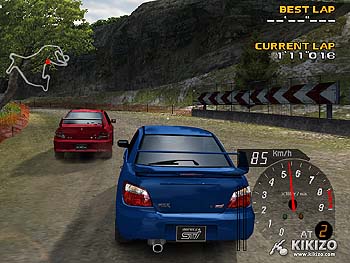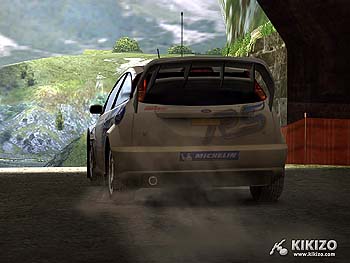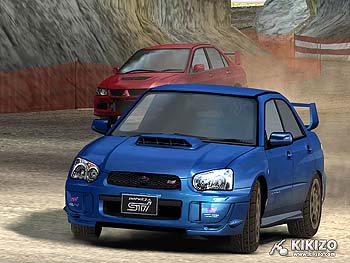Enthusia Professional Racing
One step forward and two steps back. Are we enthused about Konami's take on the world of simulation racing? Find out inside.
| Version PS2 | Developer Konami | Publisher Konami | Genre Racing |
||||
Paper is a truly remarkable substance. It is malleable, relatively sturdy and best of all, it is capable of making most any idea seem viable. That is to say, 'on paper' Enthusia Professional Racing must have seemed like a great idea; A racing simulator in the vein of Gran Turismo with an RPG-esque bent. Scrawled down on the shiny pages of an office notepad, the concept must have seemed impeachable, the possibilities limitless. The opportunity had at last come to create something unique within the genre.

And to its credit, the game begins in just such a fashion. The opening cinematic is, well, it's different to say the least. Somewhat esoteric and an oddly moralistic, almost spiritual take on racing that succinctly conveys Enthusia's theme of 'Racing is Life'. Or something like that. Regardless, from there begins the game's erratic downward slide.
This is not Gran Turismo. That's something of a loaded statement, because in truth, nothing is. And short of the money, time and expertise afforded Kazunori Yamauchi and his team, nothing ever will be. Similarly, the comparison may seem grossly unfair, but the fact remains that when your game is aiming at a similar market segment, contains a plethora of officially licensed cars and attempts to convey a not too dissimilar 'feel' as that venerable franchise, the comparison is all but unavoidable. But in truth, it is not the competition against which it is measured that is Enthusia's failing, but its Jekyll and Hyde nature. Every unique, somewhat interesting innovation employed herein is negated by some other equally, if not moreso, infuriating, frustrating and just plain annoying aspect.
The expected modes are here -- Free Racing, Time Attack, Versus Racing -- but it is in Enthusia Life that much of your time will be spent. Here, your racing calendar is proportioned into a dozen weeks during which time you're expected to compete in a series of disparate racing events in search of the necessary ranking points that will unequivocally define your status as the number one racer. Your best nine weeks during this period are used to calculate your overall ranking. The odds of winning any one particular race are dependant on the car you drive; the worse the car, the higher the odds. Winning against such high odds however yields a greater number of Ranking Points, proffering sufficient incentive to 'chance your arm' as it were.
Enthusia, it would seem, is where generic RPG conventions come to die. In addition to the oh-so coveted Ranking Points, one must take careful note of Skill Points, Enthu Points, and Tuning Level. The latter is unique to each car you drive and will increase according to the Skill Points you accrue while driving that vehicle. With each successive Tuning Level gained, one of the car's facets (such as braking, for instance) will be improved. Furthermore, the quality of your efforts within any one race determines the number of points awarded or lost. By avoiding collisions with your opponents' vehicles and trackside objects, and by not sliding off the road, Skill Points are accrued. Conversely, points are deducted whenever any of the above occurs. Moreover, each time you engage in one of the above improprieties you lose Enthu Points. When these are depleted, you forfeit participation in a week's worth of activities in order to recoup these points. This, needless to day, can severely impact your overall ranking.
In and of itself, the Enthu Point system is not a bad idea, but its implementation is preposterous to say the least. Enforcing a more considered driving approach on the part of the player by taking points off when you initiate contact with an opponent is fair enough, but it's ludicrous as to be almost laughable when you are penalized for the AI's overly competitive driving predilections. So, in effect, players are penalized for being too aggressive, yet they are unable to drive defensively either, because should a car hit you from behind, you'll still lose points. Insane.
It all sounds rather involved, but the truth of the matter is that all of this leveling up and points acquisition amounts to a hill of beans. As with any racing game, the ultimate determining factor lies quite simply in your ability to be better than the rest of the competition. Granted, sufficiently competitive stats are required so as not to be wholly overpowered by the competition (and to accrue sufficient Enthu Points so you don't spend all your time 'waiting out' for them to regenerate), but these will all come in abundance simply by concentrating on your driving. Which is to say, it's all mostly worthless.
That being said, there is an inherent compulsion in, I would bet, most every gamer to 'level-up' as it were. In RPGs, each successive plateau brings with it a feeling of satisfaction and desire, nay, need to strive for and attain yet another level. If only to see what benefits this new epoch will provide. In Enthusia, these benefits are few and far between and unlike a wondrous new summon or flashy spell, are mostly imperceptible, and by inference, unappealing. The only major benefit leveling up provides is that it increases the number of Enthu Points you have available at any one time or that you recover after each race. This hardly makes up for the annoying penalties imposed during competition, however.
Driving Revolution, the only other mode of note, attempts to convey to players a modicum of racing skill in the guise of various challenges. In each of these, players are expected to navigate through a series of colored gates at correct speeds (indicated by the constantly oscillating colors of the gates themselves). Doing so earns ratings that range from 'Miss' to 'Perfect' and at the end of each challenge players are given a letter grade based upon their performance. It's all mildly interesting, but will not likely hold your interest for long. It does provide yet another way to unlock cars however, so there is some incentive to continue playing.
The world of Enthusia is all about balance, it would seem. Like the opening cinematic that juxtaposes exhilarating speed with, well, uh, crashing, it just can't all be good: The visuals, while not impressive, are generally well-done. Excellent car models and some interesting, appealing track design. By comparison, the sound is ineffective at best. Engine noise and the bump and grind of the vehicles is inadequate and underwhelming. And the peppy elevator music that plays as you meander through the labyrinthine menu structure can irreparably harm even the sturdiest psyche.
Despite the pervading negative tone to this piece, there is some enjoyment to be gleaned from the title. The racing is decent, if somewhat 'twitchy'; not having to perpetually tune your vehicle in order to remain competitive is a nice change of pace; and winning even when the odds are stacked heavily against you is incredibly satisfying. Enthusia is not a terrible game, but one wonders who exactly it's supposed to appeal to. The rabid sect have Gran Turismo or Forza to occupy themselves with. Enthusia's lack of true customization and any real depth for that matter will certainly not endear itself to that crowd. And the casual racer's tastes are more than catered to by the likes of the Burnout and Need for Speed series'. Enthusia therefore finds itself in the unenviable position of being 'in-between.' It's neither a fully fledged simulation, nor is it an out-and-out arcade racer. In short, it is a little of everything, that is worth, in the end, nothing.
| ||||||||||||
|
| Video Coverage (Latest Videos & Video FAQ) | |||
| PLEASE DO NOT DIRECT LINK TO ANY MEDIA FILE ON KIKIZO | |||
| Description | Dur. | Size | Details |
|
Enthusia Professional Racing E3 2004 direct feed (640x480, 1Mbps) |
0.41m | 5.27 MB | WMV |




















 Satoru Iwata Video Interview - the late Nintendo president spoke with Kikizo in 2004 as 'Nintendo Revolution' loomed.
Satoru Iwata Video Interview - the late Nintendo president spoke with Kikizo in 2004 as 'Nintendo Revolution' loomed. Kaz Hirai Video Interview - the first of Kikizo's interviews with the man who went on to become global head of Sony.
Kaz Hirai Video Interview - the first of Kikizo's interviews with the man who went on to become global head of Sony. Ed Fries Video Interview - one of Xbox's founders discusses an epic journey from Excel to Xbox.
Ed Fries Video Interview - one of Xbox's founders discusses an epic journey from Excel to Xbox. Yu Suzuki, the Kikizo Interview - we spend time with one of gaming's most revered creators.
Yu Suzuki, the Kikizo Interview - we spend time with one of gaming's most revered creators. Tetris - The Making of an Icon: Alexey Pajitnov and Henk Rogers reveal the fascinating story behind Tetris
Tetris - The Making of an Icon: Alexey Pajitnov and Henk Rogers reveal the fascinating story behind Tetris Rare founders, Chris and Tim Stamper - their only interview? Genuinely 'rare' sit down with founders of the legendary studio.
Rare founders, Chris and Tim Stamper - their only interview? Genuinely 'rare' sit down with founders of the legendary studio. The History of First-Person Shooters - a retrospective, from Maze War to Modern Warfare
The History of First-Person Shooters - a retrospective, from Maze War to Modern Warfare